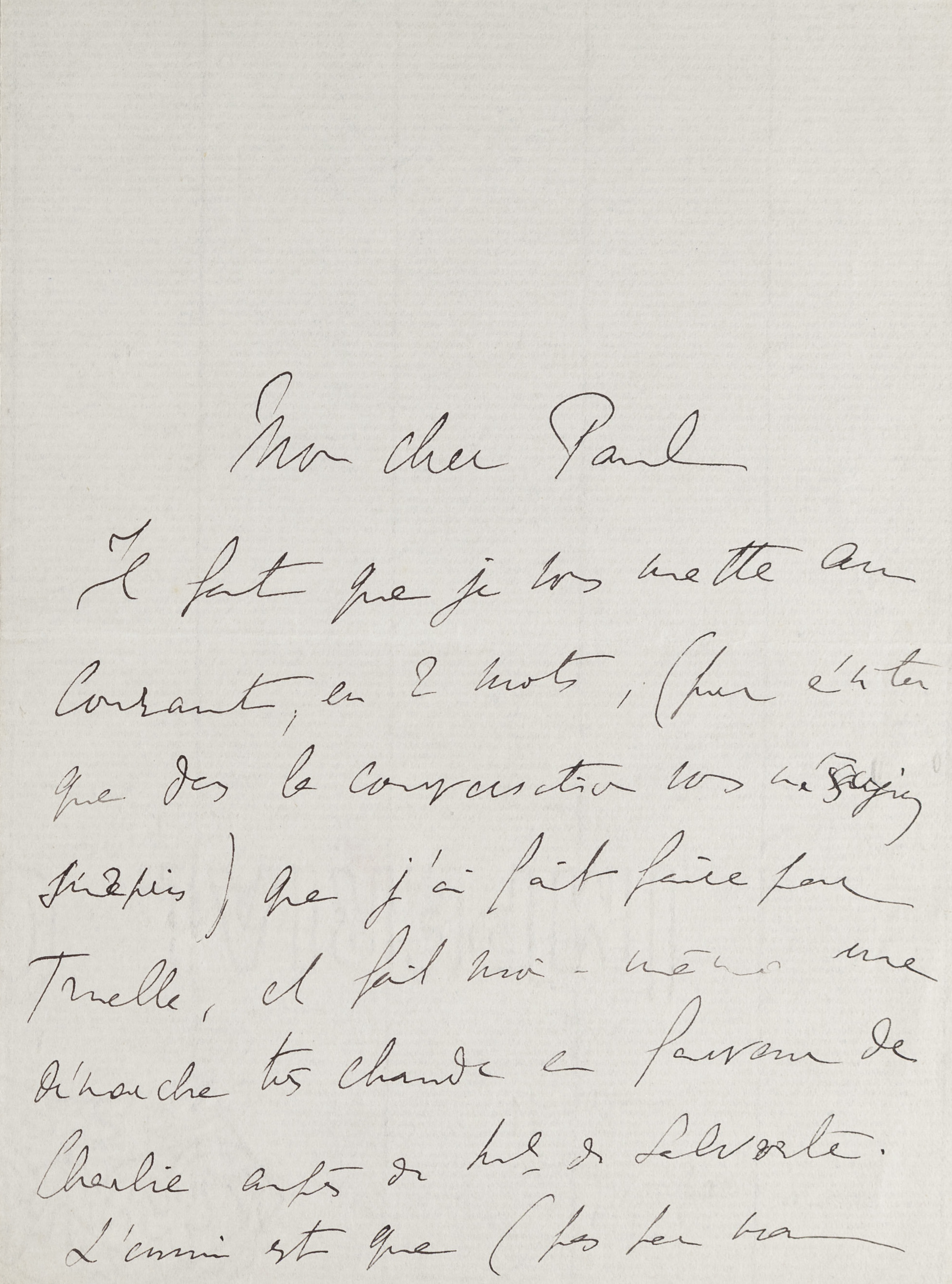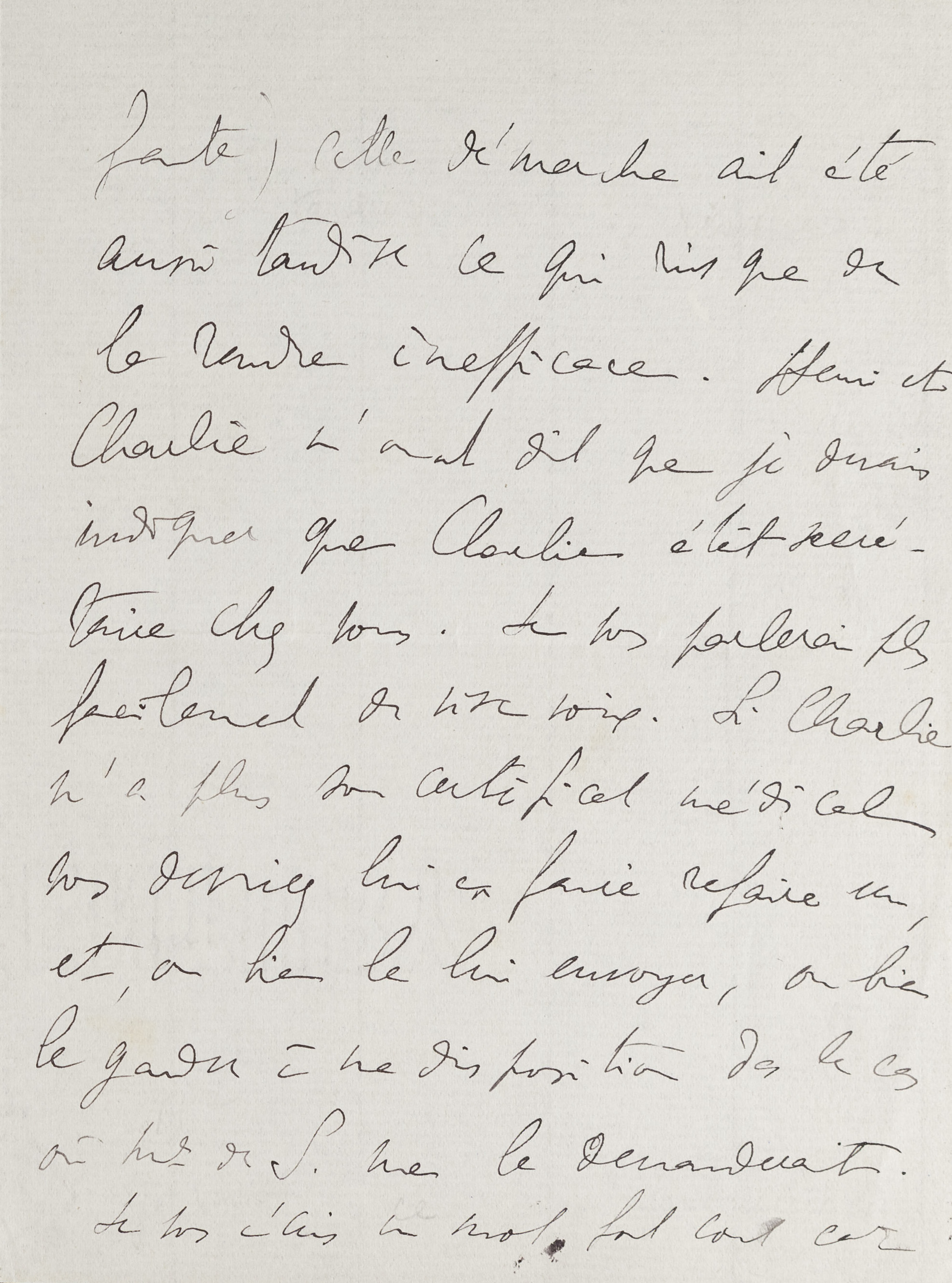By Claire Baytas, graduate student in Comparative Literature
Letter from Marcel Proust to Paul Goldschmidt, [c. December 1917] [1]
My dear Paul, [2]
I have to let you know, in a few words, (to avoid your being surprised during the conversation) that I had Truelle [3] contact, and I myself contacted Mme de Salverte [4] to advocate strongly on Charlie’s [5] behalf. The trouble is that (not by my doing) this was done so late, which may make it ineffective. Henri [6] and Charlie told me that I should indicate that Charlie was a personal secretary in your house. It will be easier for us to speak about this in person. If Charlie no longer has his medical certificate, you should have a new one made for him, and either send it to him, or keep it at my disposal in case Mme de S. were to ask me for it.
I’m writing you a very short note because I’m very unwell and have gone out only for this. I advise you to not bring this up with Mme de S. and if she speaks to you about it to tell her that he’s a young man in whom you’re interested, who was at your house, but that she couldn’t have seen him. Because it’s preferable that he not be exactly identified.
Yours,
Marcel
I would appreciate your burning this letter [7]. The state of Charlie’s health is only too real, alas, but I don’t want to seem to be protecting someone in good health if that wasn’t known.
[1] Letter catalogued as Proust-Series 1 / Lefebvre 020, Rare Book and Manuscript Library, University of Illinois at Urbana-Champaign.
[2] (Note by P. Kolb) Due the paper being the same as that of a letter from 1 December 1917, this undated letter is estimated to have been written approximately in December 1917.
[3] Jacques Truelle, a friend of Proust’s. A licensed lawyer, injured in the war in October 1914, he met Proust in 1917 and became an ambassador in Madrid (see Lettres, p. 1290).
[4] P. Kolb identifies several individuals with this name living in Paris at the time; it is unclear which of them is the Madame de Salverte mentioned in this and several other of Proust’s letters (see Corr, vol. XVI, p. 190).
[5] (Note by P. Kolb) Charlie Humphries, manservant of Henri Bardac.
[6] Henri Bardac, a friend of Proust’s. Injured in the war and discharged in September 1914, he then became an embassy attaché in London (see Lettres, p. 698).
[7] (Note by P. Kolb) The letter’s recipient sent the letter back to Proust instead, as it was found among Proust’s papers after his death.
Marcel Proust writes this letter to Paul Goldschmidt in roughly December 1917, mainly on the subject of Goldschmidt’s young English friend Charlie Humphries. Goldschmidt was a wealthy clubman from whom Proust’s housemaid Céleste Albaret claims Proust occasionally accepted dinner invitations, but whom Proust, according to her, described as both “boring” and “much too formal” [8]. Goldschmidt was also a well-known pianist [9] and figure in homosexual circles at the time. On the other hand, Proust twice invited Charlie to his home in order to study his manners and dress as material for his novel [10]. As William C. Carter remarks, Charlie’s name may have contributed to the decision to give the surname Charles to the character Morel, a violinist who is the son of a valet and thus also of the servant class in À la recherche du temps perdu. Ties are also possible to the name of one of Morel’s lovers, the Baron de Charlus (who calls Morel “Charlie” [11]), as well as Charles Swann [12]. The dedications Proust wrote to Humphries in two copies of his John Ruskin translations (likely during the war years) suggest Proust’s particularly affectionate feelings for “Charlie” [13].
Henri Bardac, for whom Charlie was a manservant, was also a friend of Jacques Truelle’s [14]. While the exact identity of Madame de Salverte remains uncertain, in a letter to Truelle from November 1917 Proust discusses potential places to dine with Truelle and Madame de Salverte in the upcoming weeks. Perhaps Charlie was the subject of their conversation, but the reasons for their meeting are not made clear [15].
While the exact condition of Charlie’s health is not known, the question of having health records that proved one to be either fit or unfit for military service was an important one at this time. In December of 1917, France was still in the midst of the First World War: the Americans had only declared war on Germany in April, and the traumatic Battles of the Somme and Verdun had only culminated one year prior. The background context of war reveals itself in the letter through Proust’s final line, where he alludes to the danger of “[seeming] to be protecting someone in good health.” This letter thus indicates that Proust likely intended to shield Charlie from conscription.
[8] Monsieur Proust: A Memoir, p. 187. (In French, “assommant,” “[Goldschmidt] est bien trop collet monté,” in Monsieur Proust: Souvenirs recueillis par Georges Belmont, p. 229.)
[9] See Corr, vol. XII, p. 147-9, or Lettres, p. 614. A performance by Goldschmidt and Georges Enesco on April 9, 1913 of César Frank’s Sonata for piano and violin (1886) is often cited as an important moment of inspiration for the Recherche’s famous Vinteuil Sonata.
[10] Monsieur Proust: A Memoir, p. 187 and 240. (In French, Monsieur Proust: Souvenirs recueillis par Georges Belmont p. 229 and 286.)
[11] See for example Sodome et Gomorrhe, p. 399.
[12] Carter, p. 650.
[15] See Corr, vol. XVI, p. 287-88.
Works cited
Albaret, Céleste. Monsieur Proust: A Memoir. Trans. Barbara Bray. New York: McGraw-Hill, 1976.
– – –. Monsieur Proust: Souvenirs recueillis par Georges Belmont. Paris: Robert Laffont, 1973.
Carter, William C. Marcel Proust: A Life. New Haven: Yale University Press, 2000.
Mauriac Dyer, Nathalie. “La collection oubliée de Georges Van Parys : Une dédicace à Hubert de la Rochefoucauld, deux dédicaces à Charles Humphries et une lettre à Jean Cocteau.” Bulletin d’informations proustiennes, 47, 2017, 47-55.
Proust, Marcel. Correspondance. Ed. Philip Kolb. Paris: Plon (21 vols), 1970-1993.
– – –. Lettres. Ed. Françoise Leriche with Caroline Szylowicz. Paris: Plon, 2004.
– – –. Sodome et Gomorrhe. Paris: Gallimard (folio), 1989.


